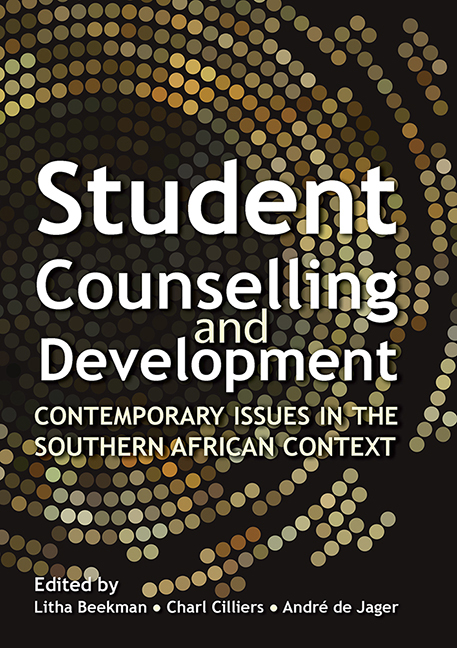 Student Counseling and Development in the South African Context
Student Counseling and Development in the South African Context Book contents
- Frontmatter
- Contents
- Figures
- Tables
- Preface
- Section 1 Development of Student Counselling and Development in Southern Africa
- Section 2 Theoretical Foundations of Student Counselling and Development in Higher Education
- Section 3 Services and Programmes Provided by Student Counselling and Development Units
- Section 4 Student Counselling and Development For Special Groups
- Section 5 Quality Assurance and Ethical and Professional Issues
- Contributors
- Index
Chapter 10 - Academic Development
Published online by Cambridge University Press: 22 February 2020
- Frontmatter
- Contents
- Figures
- Tables
- Preface
- Section 1 Development of Student Counselling and Development in Southern Africa
- Section 2 Theoretical Foundations of Student Counselling and Development in Higher Education
- Section 3 Services and Programmes Provided by Student Counselling and Development Units
- Section 4 Student Counselling and Development For Special Groups
- Section 5 Quality Assurance and Ethical and Professional Issues
- Contributors
- Index
Summary
INTRODUCTION
Academic development and academic counselling have traditionally been important components of the job description of student counsellors. The function of student counselling has become more important because the majority of students struggle with adapting to the academic demands of tertiary studies, and due to the focus on improved throughput and retention within South African higher education (HE). In order to understand the concept of academic development (AD) and its role in student counselling, its historical roots will be explored. Thereafter, some theoretical constructs which can be used to understand AD will be discussed. Lastly the role and implementation of AD at the University of Johannesburg (UJ) will be investigated.
LEARNING AND LEARNING DEVELOPMENT
Academic development activities are mainly aimed at contributing towards the core business of academic institutions, which is teaching. This contribution is usually made by enhancing student learning through intentional interventions, actions and services aimed at facilitating effective learning. The question is: what is meant by the term “learning”?
The Oxford Advanced Learner's Dictionary (2000, p. 673) defines the term “learning” as: “(1). The process of learning, and (2). Knowledge that you get from reading and studying”. The word “learn” is defined as “to gain knowledge or skill by studying, from experience, from being taught, etc.”. These definitions describe the complex concept of learning with very broad brush strokes and, basically, state that learning includes any process or activity that involves gaining knowledge and/or skills. The academic discourse defining what learning actually is and how it takes place is complex and contains many different points of view. Siemens (2005) suggests that when defining learning, differing interpretations of intent and method of learning should be kept in mind. The inherent complexity of the debate often leads to ambiguity when using the word “learning”. For the purpose of this chapter, the more general definition given above provides sufficient clarity of meaning.
There is a distinction between two types of learning approaches that is relevant for the discussion in the rest of this chapter. This is the distinction between the so-called “deep” and “surface” learning approaches.
- Type
- Chapter
- Information
- Student Counseling and Development in the South African ContextContemporary issuesin the Southern African Context, pp. 194 - 210Publisher: University of South AfricaPrint publication year: 2012
